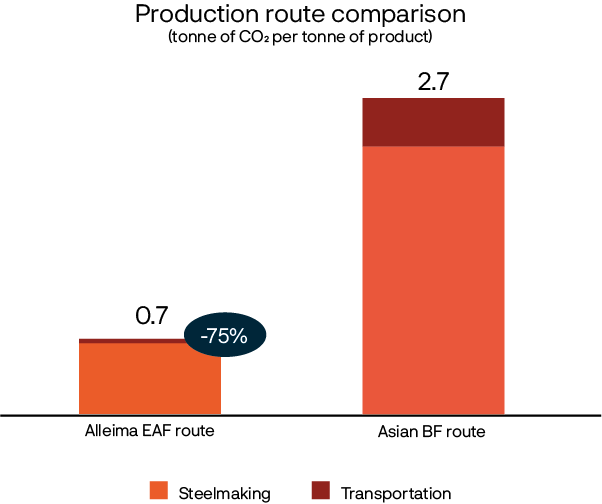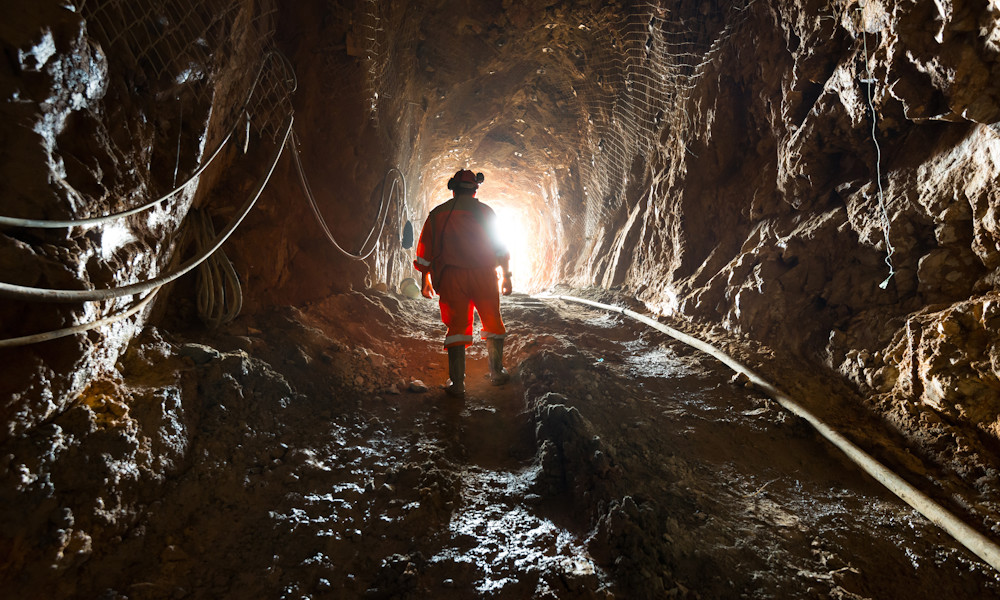Life cycle assessment (LCA) Skip to content
Lower emissions than generic data
Alleima's commitment to sustainability shines through in our rock drill steel (RDS) products, exemplified by the remarkable carbon footprint data.
Alleima has reduced carbon emissions significantly through efficient processes, the use of fossil-free electricity, and dedicated investments such as conversion to fossil-free fuels for heat treatment. This pave the way for a greener future.
Alleima conducted an in-depth analysis for one of the RDS products Sanbar®64. By comparing the carbon footprint using precise supplier data and comprehensive generic database information on alloys and energy. This resulted in a phenomenal 57% reduction in carbon footprint, proving that Alleima is not just a steel supplier—it's a sustainable force to be reckoned with.

Note that the impact is expected to continue to decrease as supplier data is continuously collected and applies in the LCAs of Alleima.
Calculations tailored to the production process
The LCA calculation is tailored to the specific production process of rock drill steel at Alleima, which results in a more precise assessment of the carbon footprint and reveals significantly lower impact compared to when generic data is applied.
Since the calculation of the carbon footprint includes the manufacturing processes, Alleima can provide customers with more representative impact values.
A customers of Alleima, Epiroc Drilling Tools, emphasize the importance of stepping away from using generic data since these impacts tend to be higher, less representative, and less reliable.
"We need to have accurate and reliable data from our suppliers to present ourselves as reliable" - Michael Jansson, General Manager at Epiroc Drilling Tools

Providing LCA will be a necessity to make business in the future
Epiroc Drilling Tools seek to buy steel with a minimal environmental impact as part of their commitment to sustainable practices. By incorporating third-party reviewed carbon footprint data from Alleima into their calculations they can identify areas of significant impact in their processes and make environmentally conscious choices, meeting their sustainability objectives.
In addition, communicating their own transparent and representative data on environmental impact can support differentiation in the market, providing a clear competitive advantage.
Michael Jansson believes it will be beneficial to be a step ahead in carbon footprint matters and that the LCA from Alleima gives Epiroc Drilling Tools an advantage in the industry.
“Having a lower carbon footprint will be a competitive advantage if we can closely match prices with others and at some point, it needs to become a cost advantage to have lower emissions”. – Michael Jansson.
Extracting the data
A detailed model has been built to extract the data. It has been under development for some years, but it was recently decided to accelerate the LCA work by appointing a LCA specialist, Nicole Holmgren.
Since then, the LCA model has been optimized and updated with production data based on the year 2022, and built on the production processes and steel recipes of Alleima, currently covering the production site in Sandviken. This enables the extraction of a product-specific cradle-to-gate carbon footprints for all Rock Drill Steel product.
How does the sourcing of raw materials and energy impact the carbon footprint?
Raw materials
The primary factors contributing to the carbon footprint in stainless steel production might surprise you—it's not just the melting process of the material. In reality, it's primarily the mining of the alloys and the processing of them into virgin alloys. Therefore it is important to be careful when selecting raw materials suppliers.
There is a significant difference between a supplier with verified low carbon emissions and those relying on generic industrial data. Presently, not all raw material suppliers have a product specific carbon footprint to share, but Alleima encourages all suppliers to verify their production processes. The future aspiration for Alleima is to only buy from producers that can provide verified Life Cycle Assessment (LCA)—showing low carbon emissions.
Melting of the material
Also, the choice of melting practice influences the carbon emissions. At Alleima we use more than 90% recycled material when melting our rock drill steel products in our electric arc furnace (EAF).
The Electric Arc Furnace (EAF) is a well-established production process utilized in Europe and the US and has been used for decades. However, in other parts of the world, blast furnaces (BF) remain in operation. BF mainly relies on primary resources like iron ore, which require decarbonization and will result in high outlets of carbon emissions. This in turn, significantly affects carbon emissions, with emissions to the atmosphere being 4-7 times higher compared to using an EAF.
Another factor to consider is that the two production routes operate on different energy sources. The blast furnace primarily relies on coke as fuel for the melting process, while the electric arc furnace operates using electricity. The energy intensity of the EAF is estimated to be one-eighth that of the production from iron ore, a distinction that is reflected in the carbon footprint of the processes.
Swedish fossil-free electricity
All the electricity utilized by Alleima for the melting process is sourced from the Swedish energy grid and is completely fossil-free. It is generated from a combination of hydroelectric, nuclear, wind, and solar power. This further reduces the carbon footprint associated with all our products.
Transportation
Reducing the distance between the steel producer and the customer can lead to a significant reduction in the carbon footprint associated with transportation. For instance, transporting 1 tonne of steel from the Alleima Sandviken site to central Europe results in a carbon footprint approximately one-sixteenth of the carbon emissions produced when transporting 1 tonne of steel from Asia to central Europe.

Q&A
To provide reliable and solid LCA data, the Alleima LCA model has been reviewed by IVL – Swedish Environmental Research Institute (IVL), which has long experience and a high level of competence within this field. IVL has also supported in the development of the data management and the development of the model as such.
The LCA data for RDS products has been developed in line with ISO14067 (ISO14040/ISO14044 family) which is the most common, globally accepted LCA standard.
One of the key advantages of LCA is that it pinpoints the areas within a product’s lifecycle with the most significant environmental impact. With this information at hand, we can then specifically target areas for improvement, effectively reducing the product’s carbon footprint. By analyzing resource usage, for example, it is also possible to optimize the utilization of resources, such as switching to materials with lower carbon footprints.
1. Identifying hotspots
―Identifying hotspots within a product life cycle allows for improvements, leading to a reduced environmental impact
2. Resource preservation
―Identifying opportunities for resource preservation by opimizing use of resources, and identifying alternative materials that may be more sustainable
3. Costs savings
―Potential cost savings by identifying and implementing more efficient processes
4. Competetive advantages
―Sustainability and transparency strenghtens relations with stakeholders. Helping customers reaching their climate targets
Contact your Alleima sales representative.


